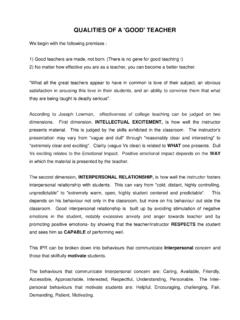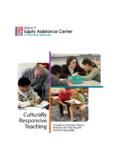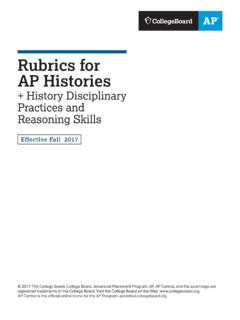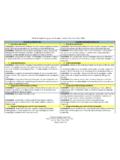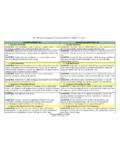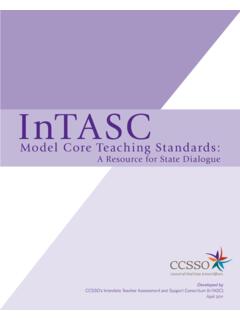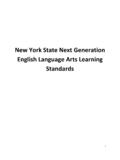Transcription of Teacher Professional Learning and Development Best ...
1 Teacher Professional Learning and Development Teacher Professional Learning and Development Best evidence Synthesis Iteration [BES]. Helen Timperley, Aaron Wilson, Heather Barrar, and Irene Fung, University of Auckland Teacher inquiry and knowledge-building cycle to promote valued student outcomes. What are our students'. Learning needs? What do they already know? What sources of evidence have we used? What are our own What do they need to learn Learning needs? and do? How do we build on what How have we contributed to they know? existing student outcomes? What do we already know that we can use to promote valued outcomes? What do we need to learn to do to promote valued outcomes? What has been the What sources of evidence /.
2 Impact of our knowledge can we utilise? changed actions? How effective has what we have learned and done been in promoting our students'. Learning and well-being? Design of tasks and experiences Teaching actions H. Timperley, A. Wilson, H. Barrar & I. Fung (2007). Teacher Professional Learning and Development : Best evidence Synthesis Iteration Wellington, New Zealand: Ministry of Education Teacher Professional Learning and Development Best evidence Synthesis Iteration [BES]. Helen Timperley, Aaron Wilson, Heather Barrar, and Irene Fung, University of Auckland New Zealand Ministry of Education This report is one of a series of best evidence synthesis iterations (BESs) commissioned by the Ministry of Education.
3 The Iterative Best evidence Synthesis Programme is seeking to support collaborative knowledge building and use across policy, research and practice in education. BES. draws together bodies of research evidence to explain what works and why to improve education outcomes and to make a bigger difference for the education of all our children and young people. Each BES is part of an iterative process that anticipates future research and Development informing educational practice. This BES is fundamental to the effective use of all the schooling BESs because it illuminates the kind of Professional Learning for teachers that strengthens valued outcomes for diverse learners. New BESs will progressively become available at Feedback is welcome at Note: The references printed in bold refer to the list of URLs found in Appendix 3.
4 These are a selection of useful sources for teachers and Teacher educators who want to engage more deeply with the issues raised in this best evidence synthesis iteration. Published by the Ministry of Education, Box 1666, Wellington, New Zealand 6140. Copyright Crown 2007. All rights reserved. Enquiries should be made to the publisher. Helen Timperley, Aaron Wilson, Heather Barrar and Irene Fung assert their moral right to be recognised as the authors of this work. Dewey number ISBN 978 0 7903 2628 3. Item number 32628. PDF ISBN 978 0 7903 2629 0. PDF Item number 32629. Contents Acknowledgments ..vi vii Secondary Principals' Association of New NZEI Te Riu Roa ..xi Post Primary Teachers' Association.
5 Xii New Zealand Teachers Council ..xiii Pasi ka ..xiv Teacher education ..xiv M ori education ..xvi Chief Education Adviser, BES ..xx Summary of Findings ..xxiii Theoretical and methodological frameworks ..xxiii Findings .. xxv 1. The context of Professional Learning and xxvi 2. The content of Professional Learning and Development .. xxxi 3. Activities constructed to promote Professional Learning .. xxxv 4. Learning processes ..xl Consistency with ndings from other syntheses ..xlv Gaps in the evidence ..xlv Summary ..xlv 1. Context .. 1. New Zealand context .. 1. Issues of audience .. 3. Organisation of the 3. 2. Processes and Outcomes of Teacher Learning .. 6. Black boxes .. 7. Professional Learning processes.
6 7. Responses of diverse Teacher learners .. 13. Implications of the Professional Learning framework .. 15. 3. Student Outcomes and Responsiveness to Diversity .. 18. Determining student outcomes .. 18. Determining Teacher outcomes .. 19. Responsiveness to diversity .. 20. 4. The Framework for Analysis and Synthesis: Methods and Procedures .. 22. Identifying and retrieving the studies .. 23. Development of the theoretical framework .. 24. Mapping the studies on the framework .. 25. Putting the mapping framework together .. 29. Identifying broad categories .. 31. 5. Outcomes for Students .. 33. Effect sizes for quantitative 33. Summary of ndings .. 56. Measuring qualitative outcomes .. 60. 6. Professional Learning and Mathematics.
7 65. Studies considered .. 65. What works for whom in changing teaching of mathematics .. 71. Bringing it all 91. 7. Professional Learning and Science .. 99. Studies considered .. 99. What works for whom in changing student outcomes in 103. Bringing it all 122. 8. Professional Learning and Literacy .. 130. Studies considered .. 130. What works for whom in literacy? .. 137. Bringing it all 153. 9. Reframing Teachers' Social Constructions of 160. Studies considered .. 160. What works for whom in reframing teachers' social construction of students .. 164. Bringing it all 177. 10. What the evidence Tells Us about Some Topical Issues .. 183. Issue 1: Multiple roles of assessment in promoting Teacher 183.
8 Issue 2: The role of school leaders in promoting Professional Development .. 192. Issue 3: Teachers' existing theories .. 196. Issue 4: Professional Learning communities .. 201. Issue 5: Professional Learning in secondary school contexts .. 205. 11. Sustainability .. 218. Methodological approach .. 219. What works for whom to sustain improved student outcomes .. 220. Bringing it all 224. 12. Gaps in the 228. Appendix 1. Case Studies .. 232. Appendix 2. Methods and 269. Locating the studies .. 269. Mapping the studies into the framework .. 273. Appendix 3. URLs of citations .. 280. Appendix 4. Glossary .. 282. Table of Tables Table 1. Positive and negative examples of xxxvii Table A list of studies with effect sizes (ES) of student 35.
9 Table The range and mean effect sizes of student outcomes averaged for each 57. Table The range and mean effect sizes for all effects .. 58. Table Mathematics: core studies .. 65. Table Mathematics: supplementary studies .. 69. Table Science: core studies .. 100. Table Science: supplementary studies .. 102. Table Literacy: core studies .. 130. Table Literacy: supplementary studies .. 134. Table Reframing teachers' social constructions of students: core studies .. 160. Table Reframing teachers' social constructions of students: supplementary studies .. 163. Table Assessment use: core studies .. 184. Table Teacher Professional Learning in a secondary school context: core studies .. 206. Table Teacher Professional Learning in a secondary school context: supplementary studies.
10 207. Table A Combinations of keywords for database searches for 269. Table A A list of studies included for analysis and synthesis .. 270. Table A Main categories and subcategories of the framework .. 274. Table of Figures Figure Framework for analysing the effectiveness of Professional Learning experiences . xxiv Figure Flow chart for the analysis .. xxv Figure Typical sequence of Professional Learning opportunities .. xxxviii Figure Developing Teacher knowledge and inquiry to promote student Learning ..xliii Figure The black boxes of Teacher and student Learning .. 7. Figure Teacher Learning processes and outcomes .. 8. Figure Responses of diverse Teacher learners/communities .. 14. Figure Flow chart for the analysis.










